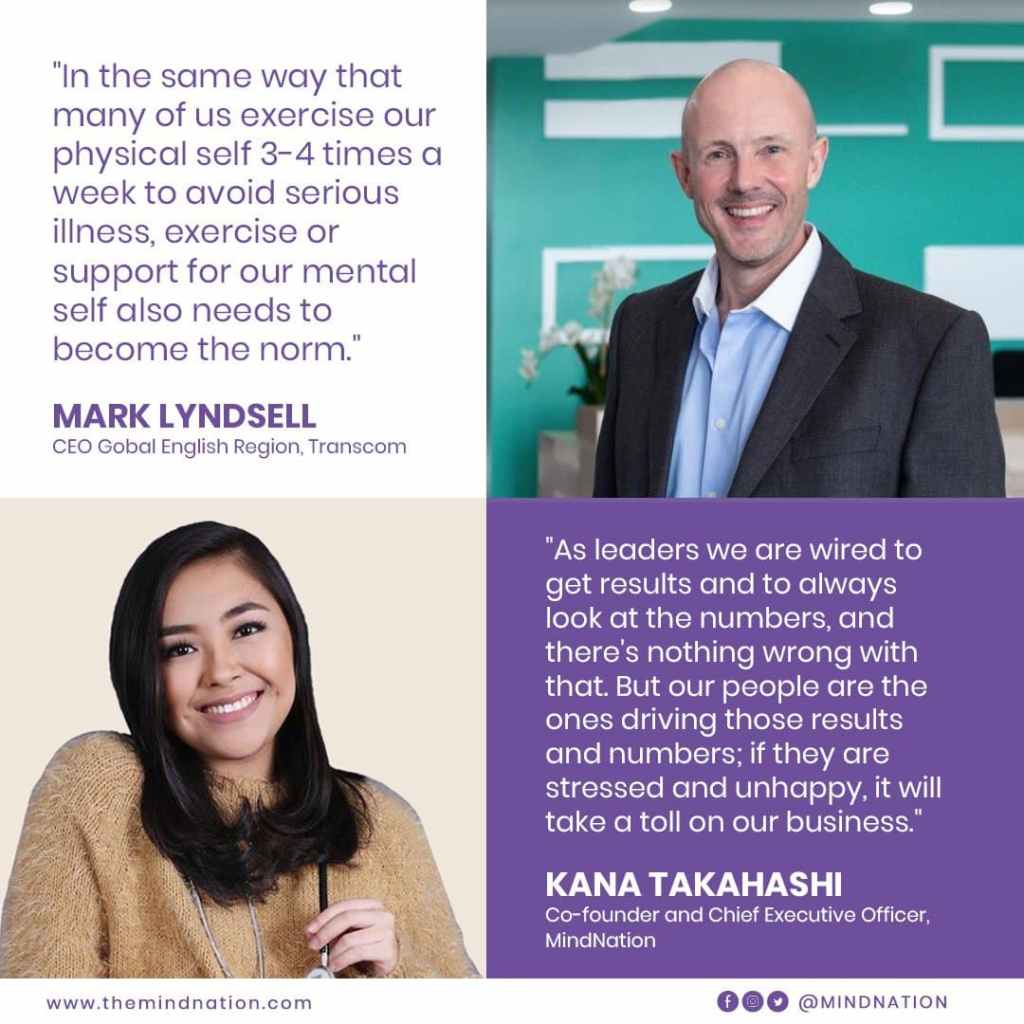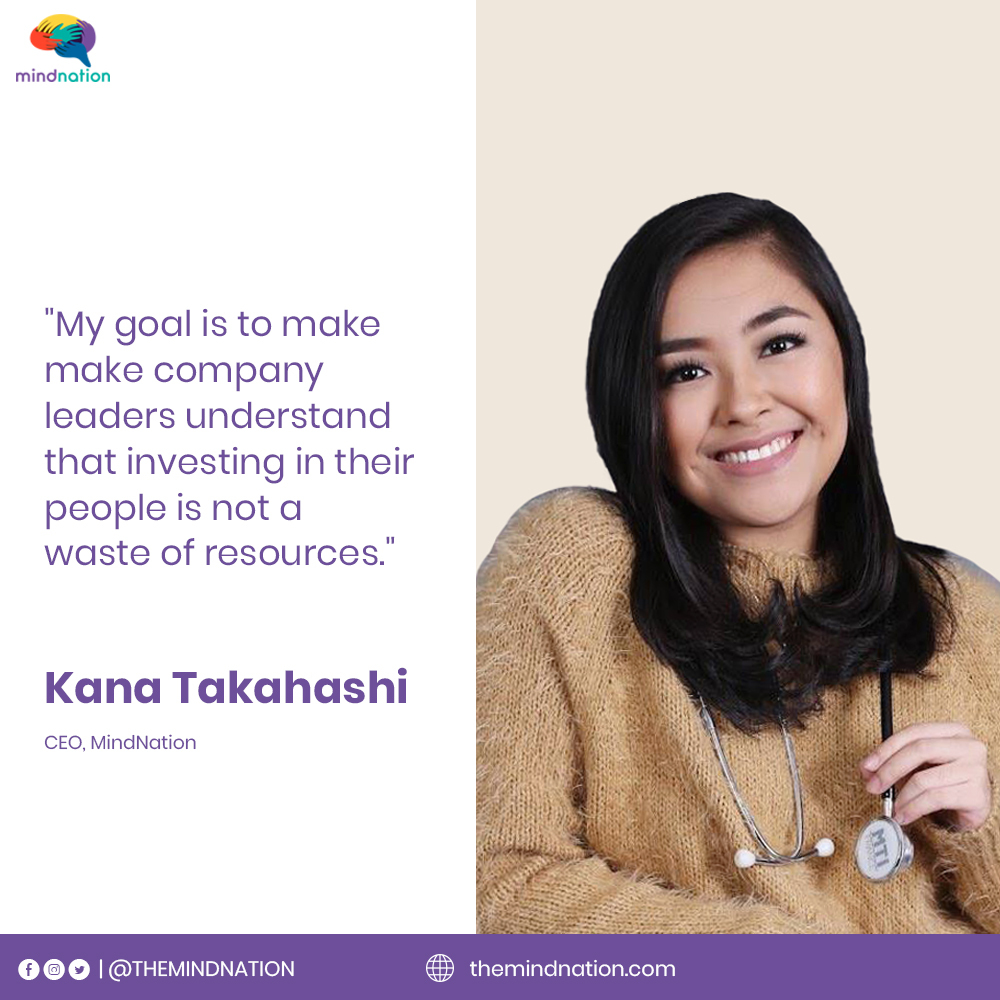Every month, members of the IT & Business Process Association of the Philippines (IBPAP) take turns hosting a CEO Forum to tackle issues relevant to the sector.
For this October — which also happens to be World Mental Health Month — Transcom Worldwide Philippines took centerstage and invited their mental health and well-being partner MindNation to join them in a discussion about “Brains and Body: Mental Health and Overall Wellness in Challenging Times.”
“The COVID-19 pandemic has shown that companies need to accelerate the conversation about mental health in the workplace,” says Mark Lyndsell, Transcom CEO for the Global English Region, in his opening remarks. “Many employees are struggling with feelings of isolation, despair, loneliness, and loss or lack of control.”
MindNation co-founder and Chief Executive Officer Kana Takahashi agrees. “Mental health concerns are becoming more alarming because of the pandemic and it’s something that companies should really look into.”

Here are other key insights that were shared by Mark and Kana at the CEO Forum:
- Mental health concerns in the workplace have financial repercussions. “Research by the World Health Organization and MindNation showed that 40% of employees are struggling with mental health issues during the pandemic,” reports Kana. “These mental health struggles have led to an increase in absenteeism, presenteeism, and staff turnover. All these productivity losses can cost companies as much as USD 400 billion dollars a year in revenue.”
- For change to happen, well-being needs to be holistically addressed. While some companies or mental health support groups offer teletherapy sessions or virtual training as a form of mental health support, Kana says that just relying on these will not yield meaningful results for the organization. “If you want the best for your company and employees, you need to offer more,” she points out. “Focus on your employees’ journey, on the company’s culture, and on the person’s overall well-being.”
This can be achieved by going back to the basics. “Create a mental health policy in the workplace that provides mental health leaves, flexible working hours, clauses for diverse groups, benefits, and other important protocols,” Kana enumerates. “Next is to make sure that basic support is there, such as virtual learning sessions and sessions with mental health professionals. Provide Critical Incident Support for emergencies. And finally, create a program for team members that encompasses the intersectionality of a person’s well-being — which means covering their physical, emotional, social, and cultural wellness, as well as financial well-being.”
- Change also needs to come from the top. “As leaders, we set the tone for the culture of the organization,” Mark explains. “In 2017, I embarked on a transformation within my organization to openly promote and hire folks from outside who actually met a specific EQ (emotional quotient) bar. And as a result, over time, we were able to build a far more mature and empathetic leadership group that continues to provide dividends to the bottomline.”
.
“If companies want to successfully address mental health at work, they need to make sure that their managers and leaders are equipped with the proper skills and training to handle employees with mental health struggles, such as empathic listening, handling difficult conversations, and even mental health first aid,” Kana shares. “Employees need to feel that the company and the people they work with are safe spaces.”
- A company that invests in its team’s wellbeing reaps benefits. “Addressing mental health in the workplace has positive business ramifications, especially when it comes to attraction and retention of talent,” Mark stresses. “Our numbers speak for themselves; our Employee Net Promoter Score (eNPS) has continued to progress consistently through the pandemic.”
The eNPS is a company’s way of measuring how employees are likely to promote the company to other people because of their positive experience. “An eNPS of 20 to 50 is considered healthy. Anything above 50 is very good to outstanding,” explains Transcom Asia Director of Employee Engagement And Communication Aldrin Carlos. “Transcom Philippines’ average eNPS in 2021 is 57.9; our score this third quarter was 62.1 versus the global score of 54.”
“As leaders we are wired to get results and to always look at the numbers, and there’s nothing wrong with that,” Kana says. “But our people are the ones driving those results and numbers; if they are stressed and unhappy, it will take a toll on our business. When you invest in your employees, you also invest in the future of your company.”
- There is no health without mental health. “When I first came to the Philippines 14 years ago, the conversation at work was all about physical health — how do we make sure our people have a healthy diet, how can we get them to stop smoking, etc?” Mark relates. “But given what we are facing now, I believe that mental health is just as important, if not more important, than physical health. In the same way that many of us exercise our physical self three to four times a week to avoid serious illness, exercise or support for our mental self also needs to become the norm.”
“As employers, we need to transcend the traditional approach of treating mental health concerns to something more innovative and proactive,” Kana says. “The more you understand your people through empathetic leadership and policies, the more you will be able to provide the right kind of support.”
MindNation uses a data-based approach to create proactive, customized, holistic health programs for your employees. Partner with us to build happier, healthier, and more productive teams. Visit http://www.mindnation.com now!





